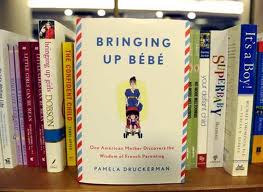I'm not very good at balance. In any given week, I might be a patient, kind, compassionate, active mom, but not a patient, kind, compassionate, active wife. And days when my marriage is prospering, my kids are freaking out--probably because I dared to put something ahead of their needs.
Last school year when I was working full-time (and showering regularly, having occasional adult conversations, and teaching 500 kids a week) I really struggled with balance. And it made sense, because I had so many things going on at once: a full-time job, church responsibilities, two active kids, and a husband in seminary. So imagine my surprise this year when as a stay-at-home mom I noticed that I am still struggling with balance, although its not of the "work/home" variety. It's of the "self/spouse/kids" kind.

articles.latimes.com
That's where the book Bringing Up Bébé by Pamela Druckerman comes in. Its been sitting on my reading wish list for months now. I have always been interested in how people in other parts of the world raise their children. And let's face it, the only way I'll ever get to visit France again is through the pages of a book. Druckerman, a New Yorker, chronicles her life raising three small children in Paris. She notices key differences in parenting tactics between French and Anglophile families and uses her journalism background to research French parenting philosophy.
The French use the word éducation to describe upbringing. They view children, even tiny infants, as rational human beings able to use reason and logic to problem solve and communicate. So they talk to their babies and young children rationally and calmly. French parents expect small acts of naughtiness, or bêtises, as a way for children to test the boundaries and find their limits. There are still non-negotiable behaviors, but those are clearly defined by parents and reinforced by society. Druckerman noticed that remarkably, most French parents seem to operate under the same framework, or cadre, and that these rules of éducation include firm limits but lots of autonomie within those limits.
Druckerman noticed that French mothers, at least the ones she observed and interviewed, viewed parenting as pleasure, not as hard work or drudgery. It should be noted, though, that these mothers do something we American moms often don't--they view a child's place in the family as below the relationship between husband and wife. The family does not revolve around the children. Moms and dads are not only allowed but are expected to take time alone to tend to their relationship. Once the children are off to bed, it's adult time, and this time is sacred. No one expects moms or dads to devote every waking moment to their kids' interests and activities. This is viewed as pas équilibre, or unbalanced.
Food is a point of national pride in France. Children eat a wide variety of foods with the expectation that they will learn to enjoy every morsel. Fruits and vegetables are the building blocks of their diets. The attitude in France is again about pleasure--meals are opportunities to enjoy and share the richness of taste and texture. French children don't snack except for the goûter, or after-school snack. French mothers don't walk around with baggies of Cheerios. And French restaurants don't have kids' menus--children are expected to try and eat things from the regular menu.
Druckerman learned through her oldest child's experience at the crèche, the free state-run daycare and école maternelle, the free public preschool, that French parents want their children to be interesting and eloquent. They are not concerned with their kids being the brightest, fastest, or best as we tend to be here in America. French parents understand that kids learn at their own pace and that each child has his own gifts and talents. They also recognize that not all kids will be college bound.
Bringing Up Bébé had me fantasizing about moving my family to France: the food, the architecture, the history, the culture, the cafes...but perhaps one need not be so dramatic to reap the benefits of French parenting. The one thing I take away from this book is that I need to bring pleasure back to my life. So often I do things out of duty and responsibility, not out of love or enjoyment. Perhaps that's the key to équilibre. Or at least it's a good place to start.









No comments:
Post a Comment
Note: Only a member of this blog may post a comment.